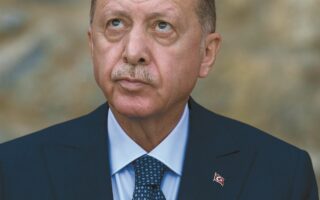Two anniversaries with risks for Greece
 One may be confident about two major factors that will shape Turkish-Greek relations in 2023. By the summer, it is likely that citizens in both countries will have voted in critical elections. It would be careless to guess at the outcome of either of these contests. Yet it is safe to say that neither Mitsotakis nor Erdogan are assured an easy victory. It is more likely that voters will wrestle with very serious issues that affect them in similar ways.
One may be confident about two major factors that will shape Turkish-Greek relations in 2023. By the summer, it is likely that citizens in both countries will have voted in critical elections. It would be careless to guess at the outcome of either of these contests. Yet it is safe to say that neither Mitsotakis nor Erdogan are assured an easy victory. It is more likely that voters will wrestle with very serious issues that affect them in similar ways.
Economic uncertainty, to varying degrees, looms over both countries. Immigration stirs discontent among the majority of Turks and Greeks. Larger numbers of voters will see the election as an opportunity to hold their leaders accountable for misuses of their power. And of course, electoral campaigns in both countries will foreground the threat and possibility of a new Greco-Turkish war. What is unclear is the extent to which Erdogan and [Greek Prime Minister Kyriakos] Mitsotakis will utilize issues in the Aegean and the Mediterranean in furthering their respective campaigns.
A second factor to consider for the coming year is the weight of history. In 2023 the Turkish government will undoubtedly take great pains to mark two important centennials. The coming summer will mark the hundredth anniversary of the signing of the Treaty of Lausanne. While Greeks are likely to look upon this moment as the culmination of the catastrophe in Asia Minor (as well as the beginning of the population exchanges of 1923-24), Turks are also likely to see Lausanne’s centennial as an opportunity to relitigate the treaty itself.
It is easy to imagine Turkish talk shows featuring regular debates about the status of Muslims in western Thrace, as well as the terms governing Greece’s sovereignty over Lesvos, Samos, Chios and other islands. Nationalists of various stripes will certainly seize upon the anniversary to decry Greece’s supposed failure to live up to its obligations under Lausanne. Still others will argue that Ismet Inonu failed the Turkish nation in his negotiation of the treaty altogether.
In October, following Lausanne’s centennial, Turkey will then celebrate its hundredth year as a republic. This anniversary, more than any, is one that Erdogan has long anticipated. For years, he has promised the completion of several 2023 “mega-projects” in commemoration of the republic’s establishment. Pending his re-election as president, October 29 promises to be a crowning moment in his political career.
What do these anniversaries mean for Turkish-Greek relations? Potentially quite a lot. It is very possible that the weight of these two events will catalyze both debate and action in Ankara. Regardless of the outcome of the presidential elections, Turkish political leaders are united in their desire to press forward with the country’s claims in the Aegean and Mediterranean. With Ataturk’s achievements looming in the background, both Erdogan and his opponents will likely be energized in the coming year to address the country’s grievances with Greece.
Here contingencies matter a great deal. The uncertainty of the election’s outcome, coupled with the high stakes that come with victory or defeat, may drive Erdogan, Kemal Kilicdaroglu and Meral Aksener to resort to extreme measures and positions. Nevertheless, the weight of history will undoubtedly factor into just what lengths Erdogan, or his successor, are willing to go to attain victory at the expense of Greece.
Ryan Gingeras, Naval Postgraduate School, Historian of the late Ottoman Empire.
* This opinion piece is part of an in-depth look by 10 analysts, journalists and experts into Turkey ahead of the June 2023 elections: Where will Turkey be a year from now?


